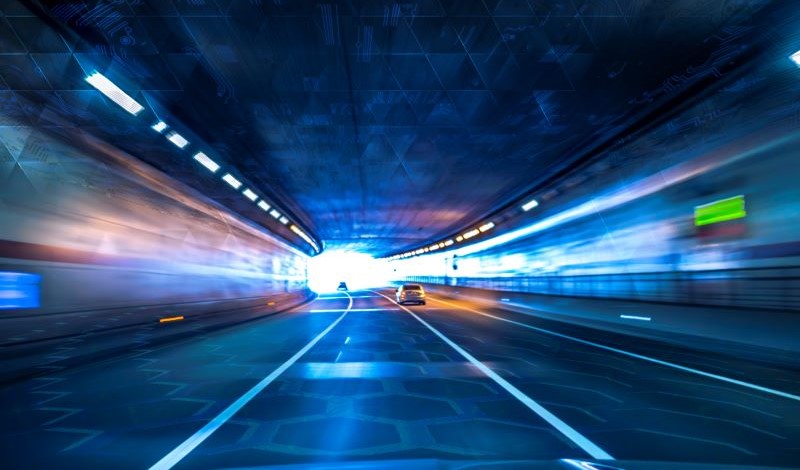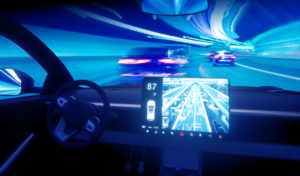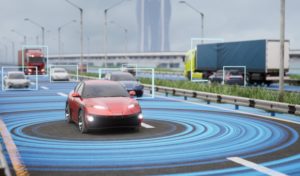
Scholar urges Congress to direct the National Highway Traffic Safety Administration to regulate self-driving cars.
Manufacturers and accident victims reported nearly 400 crashes involving cars equipped with autopilot between July 2021 and May 2022, according to a report issued by the National Highway Traffic Safety Administration (NHTSA). Six of those crashes resulted in fatalities, and many more caused injuries. But despite these crash numbers, no federal regulator reviews autonomous vehicle technology before autopilot-enabled vehicles hit the road.
To fill this regulatory gap, the U.S. Congress should grant NHTSA the authority to regulate technology, argues scholar Amin R. Yacoub. He asserts that doing so would align the regulation of autopilot technology more closely with that of other sectors—such as the communications and pharmaceutical industries—whose products must pass rigorous reviews before being used by consumers. It could also save lives.
Yacoub argues that advancements in autonomous vehicle regulation have lagged behind advancements in the underlying technology. He notes, for example, that the current legal framework for regulating on-road vehicles presupposes that a driver is active at all times.
Autopilot technology disrupts that framework. Several models of cars already in production offer “conditional automation,” meaning that the vehicle is capable of navigating autonomously under some conditions, but that a human driver must be ready to take back control of the vehicle at all times.
But one manufacturer, Tesla, has claimed that its cars are capable of reaching the level of automation at which the vehicle drives itself without human intervention. Tesla’s official YouTube account, for example, hosts videos of its cars navigating roadways without any driver intervention whatsoever. Amid ongoing scrutiny from NHTSA, however, Tesla has backed down on that claim. Tesla’s website currently notes that drivers must stay engaged at all times.
NHTSA and issue recalls for vehicles or equipment that present unreasonable safety risks—but not until after cars are on the market. “Astonishingly, NHTSA does not have the authority to pre-approve new technologies in vehicles before they are released to the public,” Yacoub remarks.
NHTSA has not totally ignored advancements in vehicle technology. In June 2021, NHTSA issued a final order requiring vehicle manufacturers and operators to report incidents involving autonomous vehicle technology within one day of learning about a crash.
Nevertheless, Yacoub argues that much more oversight is needed. He advocates that Congress grant NHTSA the authority to review all new vehicle technologies, including autopilot systems, before those technologies are made available to the public. Yacoub argues that vehicle manufacturers should be required to submit proposed autonomous vehicle technology to NHTSA for approval before the technology can be installed in commercially available vehicles. Yacoub identifies NHTSA as the proper regulator because it has the relevant automotive expertise to balance supporting technological innovation and protecting public safety.
Yacoub argues that Congress has taken similar steps in analogous circumstances. Congress established the Federal Communications Commission, for example, to oversee new technology used in radio and television broadcasting as those media gained popularity.
Furthermore, the U.S. Food and Drug Administration (FDA) today strikes the right balance between protecting public safety and supporting innovation in its oversight of the pharmaceutical industry, according to Yacoub. Medications and vaccinations can be life-changing, and even life-saving, but new formulations are subject to rigorous FDA review prior to being placed on the market. Even so, FDA retains substantial flexibility to ensure that it can respond to public health emergencies, such as by approving a needed drug or medical device under an emergency use authorization—an expedited review pathway that Congress created to enable FDA to respond to chemical or biological threats. When FDA approved the distribution of a novel COVID-19 vaccine under an emergency use authorization, t
Yacoub anticipates pushback against his proposal, including from vehicle manufacturers concerned about profits. He even credits “the deceptive lobbying of big tech” in part for the current lack of regulation. Yacoub argues, however, that the lack of early-stage technology regulation may actually hurt manufacturers, who lose both sales revenues and brand loyalty when NHTSA recalls vehicles.
Yacoub also that opponents of his proposal might argue that new technologies do not affect public safety as certainly as faulty medications, for example. Yacoub that NHTSA should expand its oversight precisely because the safety and social risks of new autonomous vehicle technologies are unknown.
He concludes that expanded regulatory oversight of autonomous vehicle technology is long overdue and Congress should vest the authority to review pre-market designs with NHTSA. He warns that public roads are no place for “technologies that seem glamorous from the outside but are inherently dangerous to humans.”



